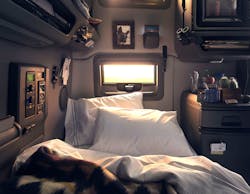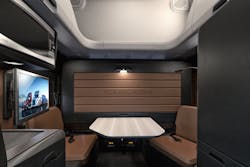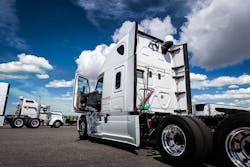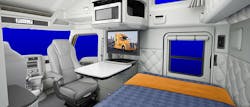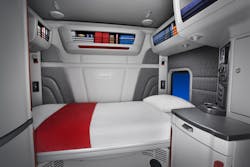Each generation of trucking has tried to find new technologies to help drivers feel more at home on the road. In the 1970s and ’80s, the CB radio gave drivers a lifeline to the world beyond the cab. More recently, smartphones and social media have provided outlets to help drivers.
Comfort on the road can go a long way for a long-hauler. In the continuing battle against the driver shortage plaguing the industry, fleets find that in-cab amenities can be the difference in attracting and retaining quality drivers. Many of these technologies help relieve driver isolation on the road, thus improving their quality of life. “That’s what drives everything for these folks because they have a very unique existence,” said Kem Wallace, McLeod Software’s senior solutions architect. “It is important to be able to shrink their world.”
While many drivers aren’t fans of technologies that track their work—such as electronic logging devices and in-cab cameras—the profession has a long history of embracing technology that improves their quality of life. Along with CBs, drivers were among the first to embrace debit cards, fuel cards, and prepaid calling cards in the 1980s and 1990s, Wallace noted.
Creature comforts
A modern truck with new amenities can go a long way. “We’re constantly turning the trucks over, and that’s a big draw for our drivers,” said Craig Turner, general manager of TP Trucking. “These guys spend so much time—weeks at a time if they choose to—in these trucks. You have to make it as comfortable as possible.”
TP Trucking leases its vehicles, replacing trucks on a five-year schedule to ensure its drivers have the latest technology and creature comforts.
“Let’s face it, most truck drivers are creatures of habit,” Turner said. To help these professional drivers on the road, TP equips all its trucks with refrigerators, microwaves, televisions, and more.
The Oregon-based fleet provides power inverters for its cabs so drivers can plug in coffee machines, crockpots, or other small appliances that help make the truck feel like home. And with a lot of his fleet spending time in the hot Southwest, Turner said he’s now providing the Kenworth Idle Management System (KIMS), which provides a no-idle sleeper climate control solution that reduces emissions and lowers fuel costs while drivers are off duty. It can run for 10 hours on a single charge, providing air conditioning in the summer and heat in the winter.
Even though diesel prices have been flat much of 2020, Turner said idle management systems help keep operating costs down and reduce wear and tear on the engine when trucks are parked while still making drivers comfortable.
About four years ago, Turner was looking for “anything we could do to get a leg up and that’s when we found EpicVue,” the in-cab satellite TV company that transmits DirecTV signals right into the truck.
The EpicVue dome, mounted outside the cab, connects to a DirecTV receiver inside that cab that offers drivers up to 212 channels when stationary. To get a signal, trucks must be parked with an unobstructed view of the southeastern sky. Within a few minutes of switching on the system, a signal is acquired and drivers can catch up on their favorite shows and sports.
DirecTV’s exclusive rights to NFL Sunday Ticket, which gives drivers access to every Sunday NFL game, is a huge perk, Tuner said. “Some of the guys might get in the truck early on a Sunday before heading out for seven days to watch some football,” he said.
“The drivers love the system. They like the NFL Sunday Ticket and EpicVue is a nice attention-getting device,” he noted. “It goes back to our culture and how we treat our drivers, which is why we have a high retention rate.”
While access to live sports is a big draw for many truckers, there is also a growing foodie movement in the industry, Turner noted. “There’s a percentage of them who like to watch the cooking shows—and we see it when they bring the trucks in for maintenance. They have griddles or crockpots and stuff like that on board.”
It’s a lot easier to cook and eat better with fresh ingredients. That’s why the in-cab refrigerators have become a near-necessity for TP drivers, Turner said. “It keeps them from spending money out on the road,” he said. “The refrigerators are a big one for them. A lot of them take their vegetables or home-cooked meals, sandwiches, and lunch meats with them. There’s really a health-conscious movement in the industry right now.”
Health movement
That health-conscious movement is gaining momentum throughout the industry. The sedentary lifestyle of the job puts drivers at a greater risk for high blood pressure, cholesterol, obesity, Type 2 diabetes, and heart disease. In addition to bringing fresh food on the road so they don’t have to rely on fast food when hunger strikes, more drivers are looking for ways to work out.
Traditional wellness programs aren’t ideal for drivers, who spend so much of their time on the road. For that reason, Steve Kane created Rolling Strong nearly four years ago. “Their lifestyle is different,” Kane told FleetOwner. “Everything we do at Rolling Strong is built around what actually makes sense for drivers.”
Rolling Strong offers wellness programs that drivers—and other fleet employees—can take part in to promote better nutrition, fitness, sleep, stress management, and weight management.
The company’s RS Flex System workout kit, which can be taken on the road, features workout bands, clips, hand weights, and a kettlebell bag that can hook up inside a cab or a trailer to turn any truck into a mobile gym. The Rolling Strong smartphone app guides users through workout routines using the equipment. The app can be customized for each driver’s lifestyle and uses GPS to help drivers find healthy meals and places to walk or run on the road. Drivers can also use the app to monitor sleep patterns and prepare for the Department of Transportation physical. The company also offers access to fitness coaches to help drivers devise wellness plans that work for them.
“It’s also built in a way that allows carrier leadership to become highly engaged with the program,” Kane said. “We’ve seen that the more leadership—and mid-level management—has engaged with the program, the better success the drivers have.”
To do this, Kane enhanced the gamification aspects of Rolling Strong by creating competitions for drivers and fleets, where participants can compete against their co-workers or within the Rolling Strong community. Users earn points for eating healthy, getting enough sleep, working out, and staying hydrated. Those points can be converted into rewards such as Rolling Strong gear, truck stop gift cards, fitness trackers, and more.
The gamification aspect of Rolling Strong has helped fleets get more buy-in from employees, Kane said, which is making users healthier. “Every testimonial that we have from people that have engaged in a competition has a common theme: Being in a Rolling Strong competition has made them more mindful of their health,” he said. “It’s one thing to have a coach remind you to drink more water or make better choices on food. It’s another thing when you’re in a competition within your fleet and other people are also digging really hard to earn points as well and you can see your name on the leaderboard. If you do that for a month, the next thing you know, you’ve built a habit. It’s a fun game that leads to healthy habits.”
All in a good night’s sleeper cab
Here are some of the standard and optional sleeper cab amenities for some of the industry’s most popular long-haul trucks.
Freightliner
The Freightliner Cascadia’s optional driver lounge features a dual-seat dining/working area with a table-desk and a large, fold-down 40- by 80-in. bed. It also offers refrigerator options and storage spaces that include shelving. A swing-out TV bracket fits a 24-in. flatscreen TV to go with ambient lighting options and increased power outlets for added appliances on the road.
International
The International LT sleeper cab comes standard with 12-volt outlets to keep drivers connected while on the road. All versions of the LT sleeper have room for a microwave oven and flatscreen TV. All the various sleeper configurations feature a number of storage compartments. Larger sleepers also come standard with a utility cabinet, wardrobe tower, dresser cabinet, and room for a refrigerator.
Kenworth
The Kenworth T680 offers the optional Driver’s Studio package, which includes a 180-degree swivel passenger seat and swivel table option, which can turn the cab into a studio. The driver can watch TV or eat from the chair rather than being confined to the back of the cab. Included is a swivel TV mount that can hold a 28-in. flatscreen, a premium audio package with 320-watt amp, 10-in. subwoofer, and eight speakers. The cab is also prewired for EpicVue satellite TV, and there is space for a microwave, DVD player or game console, and a drawer-style refrigerator/freezer. Extra storage space includes a full-size wardrobe for hangers and under-bunk storage.
Mack
The Mack Anthem’s 70-in. sleeper includes lots of storage options, including above- and below-bunk cabinets and a wardrobe for hangers. The flexible workspace behind the seats includes a pullout surface for work or eating. Mack offers a stainless-steel refrigerator or prep kits that include power outlets for a driver’s own fridge, microwave, or flatscreen TV. The sleeper control panel in the Anthem, which also offers power outlets and ports, can control the sleeper stereo, interior LED lighting, and HVAC.
Peterbilt
The Peterbilt 579 UltraLoft features an interior height of over 8 ft. and more than 70 cu. ft. of space in the sleeper. It provides multiple compartments, a large wardrobe closet, and several cubbies. Along with a workstation, the UltraLoft offers a flatscreen TV mount on a swivel. There is space for a refrigerator and microwave. A fold-away ladder provides access to a second upper bunk, and soundproofing in the cab helps keep out noises so drivers can rest easy.
Volvo
Volvo said its VNL sleeper cabs offer the largest refrigerator in the industry and space for most small microwaves. There is an optional reclining lower bunk with a fold-away table beneath an optional upper bunk with a telescopic ladder. The sleeper control panel is right next to the lower bunk and offers lighting control, locks, an inverter, charging and audio ports, and a panic button to call attention to the vehicle.
About the Author
Josh Fisher
Editor-in-Chief
Editor-in-Chief Josh Fisher has been with FleetOwner since 2017. He covers everything from modern fleet management to operational efficiency, artificial intelligence, autonomous trucking, alternative fuels and powertrains, regulations, and emerging transportation technology. Based in Maryland, he writes the Lane Shift Ahead column about the changing North American transportation landscape.

